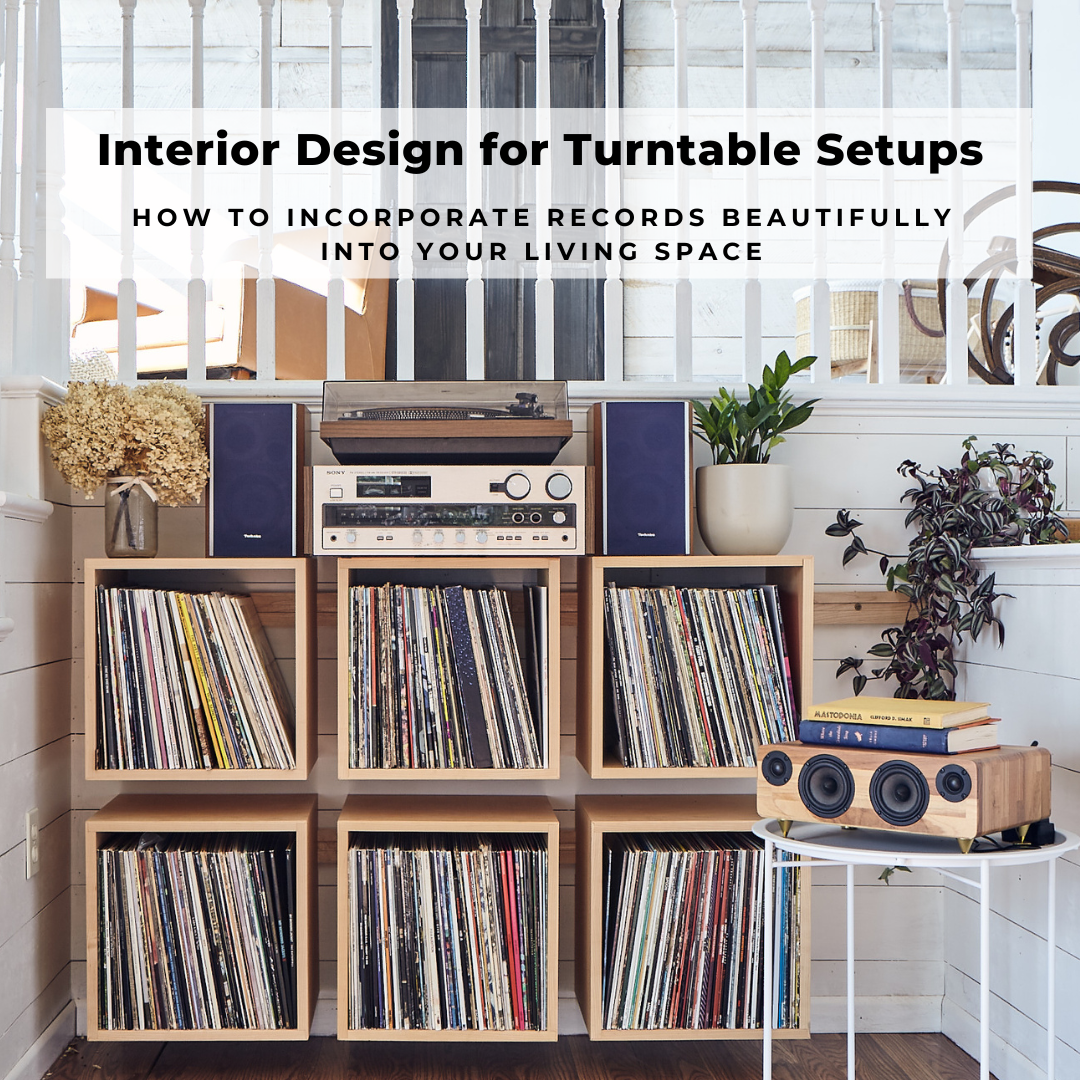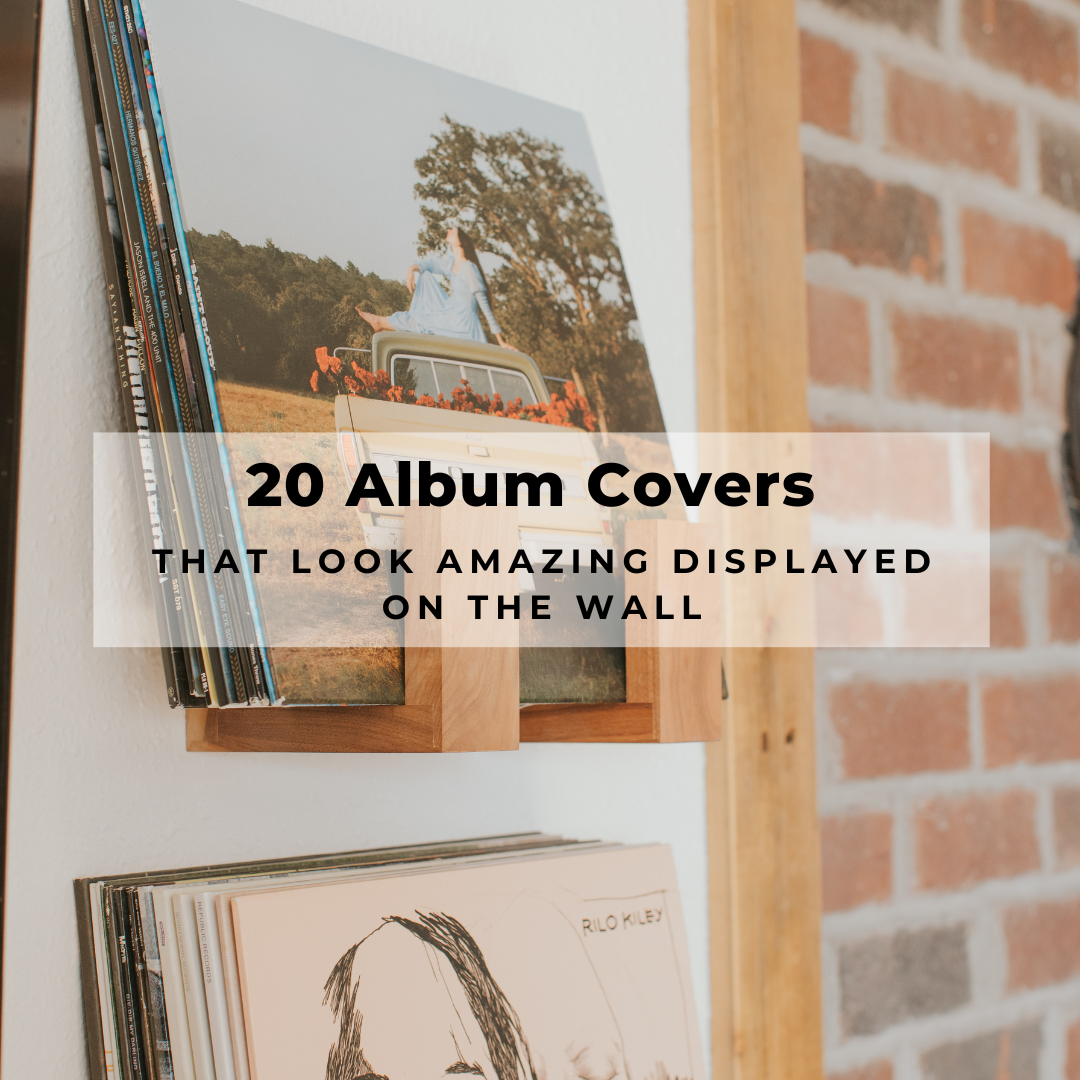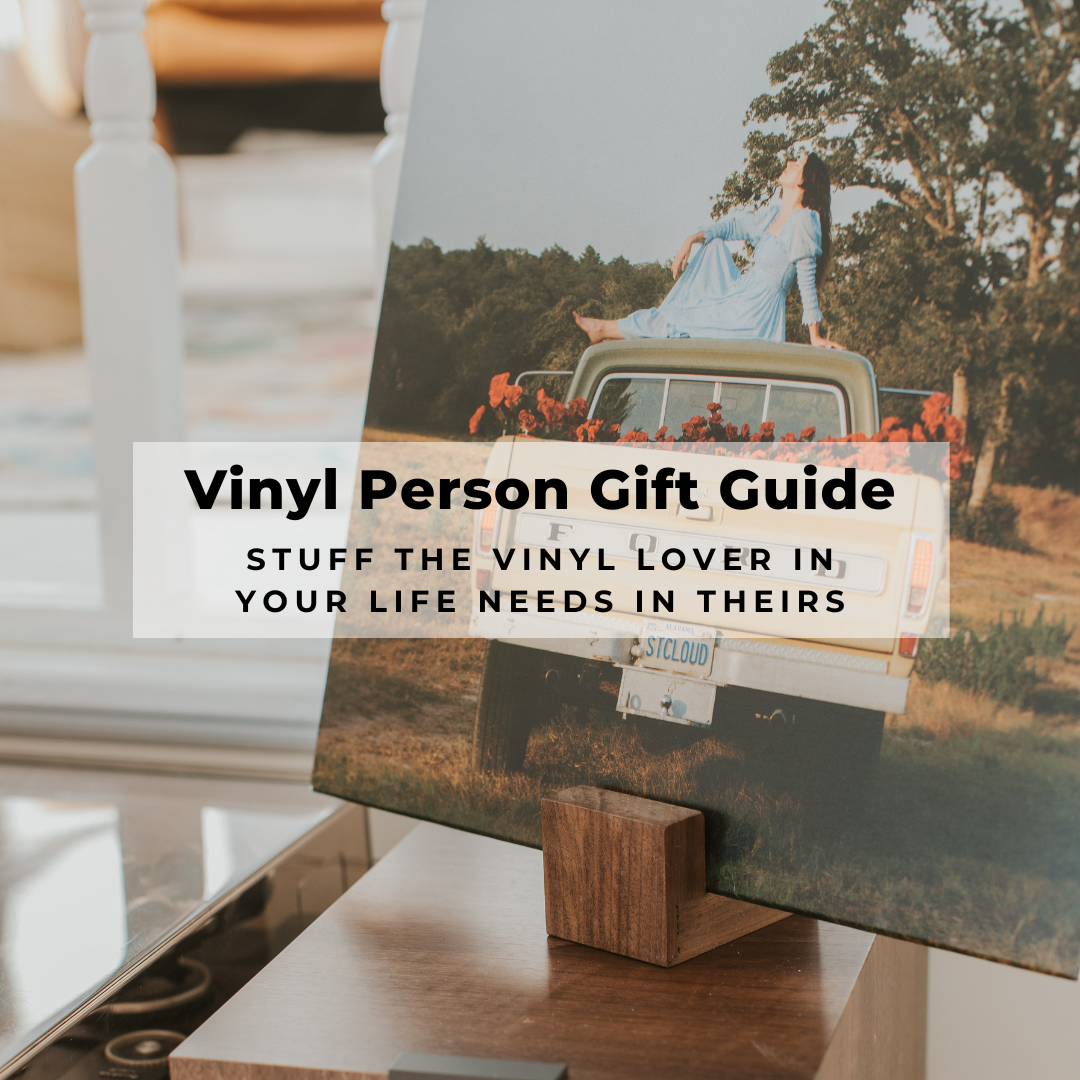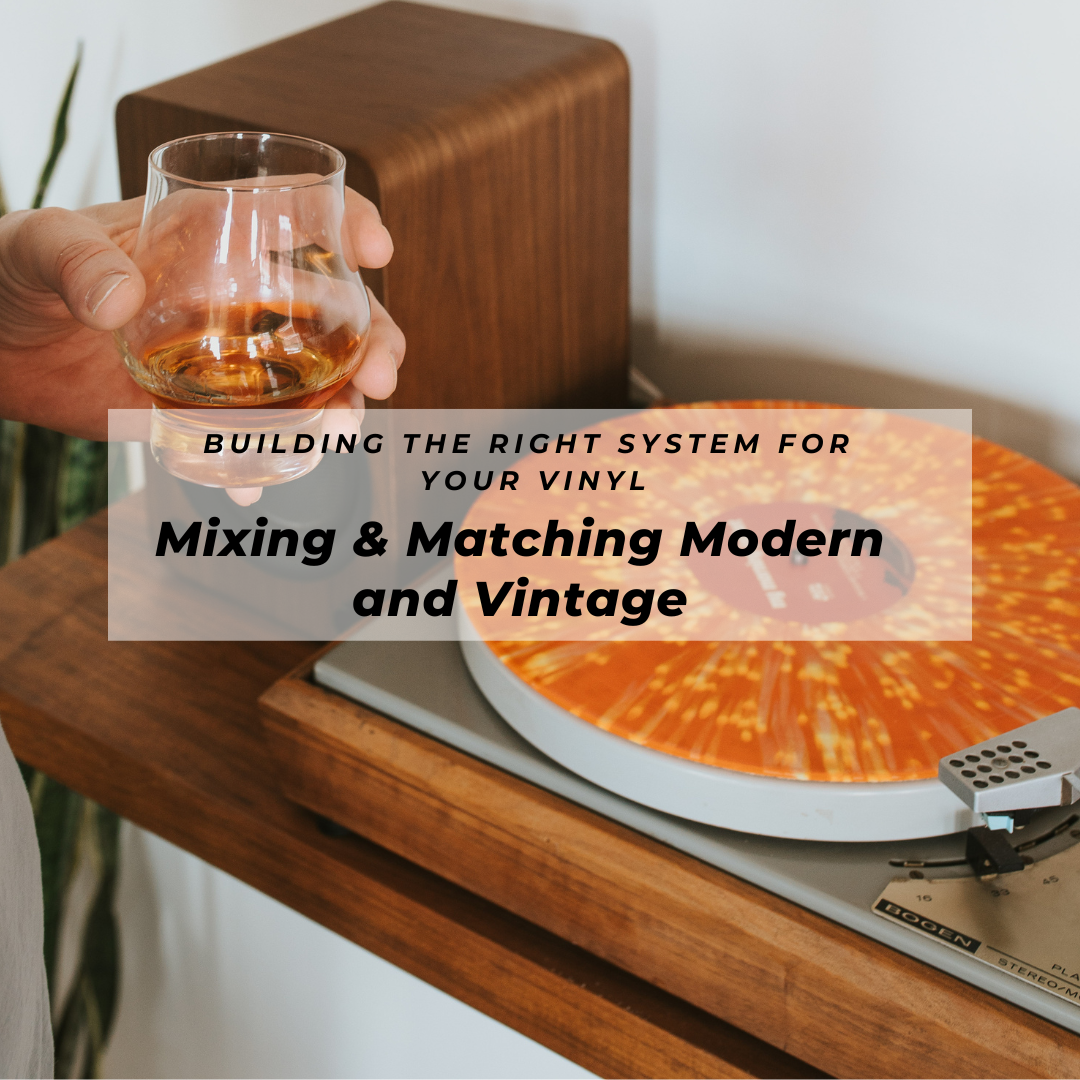Interior Design for Turntable Setups: How to incorporate records beautifully into your living space

Have you thought about getting a record player, but wondered where to put it? Have you brought home a record player, and then didn’t know where to put it? Do you have a record player, but now feel the clutter is strangling you?
Record players can be a challenge to design around. They can be big. The equipment is often bulky. And record collections can clutter up a room real fast if you let them. So how do you design a space where a turntable doesn’t look like an uninvited house guest? We talked to four design experts to get a professional take on laying out and organizing your space with vinyl in mind.
Gorgeous record nook by Lilianne Steckel Interior Design
It’s not about theory, it’s about you
We asked all of our experts about where they would start explaining design to a novice, thinking that they would talk about principles of balance, rhythm, and harmony, or design styles like modern, farmhouse, etc. Nope. To a person, they said the place to start is: what do you like, and how are you going to use the space?
Lisa Gilmore, Principal Designer and CEO of Lisa Gilmore Design says the core thing she wants to understand about a client is “how they want to live in their space. And not only how they want to live in their space, but how they want to feel when they come into their space. Is it somewhere you want to be energized and motivated? Is it purely for relaxation, because you have a busy job and when you come home it’s down mode? Or do you have a kid and you have wild stuffed animals everywhere that you need to wrangle and put away? Those are really important things.”
Record area designed for a family by Lisa Gilmore Design
For Lilianne Steckel of Liliane Steckel Interior Design, trying to think or speak purely in design terms can actually get in the way. “Design language can be miscommunicated. If you say ‘modern’ to five different people, they might all think of something different.” Talking about a vibe or a feeling can help you hone in on what you really want. “If you say ‘relaxing’,” continues Steckel, “well, what are you doing? Are you listening to music? Are you reading a book? Are you drinking a whiskey? Are you sitting in silence? What does it mean for you?”
Ok, function and vibe. How do I get that right?
At a high-level, designing for function is obvious enough. Is this an office? You’ll likely want a desk and won’t want to put it in the busiest place in your house. Is it an entertaining space? You’ll want to have enough seating (or at least enough standing room for guests). And don’t try to make one space do too much. “Sometimes people try to make a room their living room/office/workout space,” says Professional Organizer and CEO of Composed Living Elsa Elbert. “And the reality is that you’re not going to enjoy that space for any of those things because it’s going to be too overwhelming.”

Elegantly styled shelves by the Composed Living team
The trickier part is setting a visual tone that will put you in the right frame of mind. We each have our own taste, so a design element that feels calm to one person might feel cold to another. And most of us aren’t design experts, so we may not know what is going to feel right to us. Which means you have to do some exploring. “I always tell people it’s like dating, and you just have to be open and vulnerable about the things that you like and dislike,” Gilmore says. She suggests identifying what you don’t like first, so you can narrow down your options.
“It’s important to look out for the type of furniture that you’re attracted to,” she continues. “Do you like more minimalist styling and streamlined design? Or do you like a bit more detailing, like a brutalist piece, for instance, that has a hallmark carving or things like that. Or are you more traditional?”
And sometimes it’s a lot simpler than details and styling. “A lot of times, it’s about the color,” says Steckel. “That spurs relaxation.”
Take inspiration, but don’t follow trends
If you are new to design (and even if you aren’t), you are likely going to need to look at other homes to get some context and inspiration. Social media platforms like Instagram and Pinterest can be a great resource because there are so many design concepts on them. But beware following too closely. “I encourage my clients to stay away from things that are trendy,” says designer Kelly LaPlante. "Trends can be really fleeting. It's not uncommon to be interested in a trend and then be sick of it six weeks later. And this happens faster these days because, with Instagram and these other platforms, you will just see so many things get played out so quickly."
Gilmore tells her clients not to copy Instagram. “Try to dial in on what it is you’re actually attracted to,” she says. “Is it the use of lighting? Is it a really interesting wood detail?” Thinking about the broader effect, rather than the specific detail, can help you avoid creating a space that feels dated a year or two later.

Eclectic turntable setup designed by Lisa Gilmore Design (including a spectacular Shinola turntable)
Lastly, our experts warn, be practical. “A huge trend right now is using a lot of plaster and brass… and concrete tile,” says Steckel. “It does not mean that you have to have exactly the same thing. Concrete tiles are really challenging to install. They’re hard to clean. I see a lot of installers mess them up.” Remember, you have to live in your space. It’s not just a photo op.
Take your time
Nailing a vibe can take a lot of work, especially if you don’t know exactly what you want when you start out. And if you just moved into a space, life there may turn out differently than the way you initially imagined. So don’t rush it. “I advise that clients live in the space for awhile before they finalize it,” says LaPlante. “Sometimes you think you are going to use a space one way, and you end up using it another.”

Mid-century style with vintage turntable system including wall-mounted Deep Cut Wall Cubes to store and display records.
If you are feeling unsure about a choice, or feeling some decision fatigue, don’t force it. “If you’re unsure or you feel like you’re starting to question your decisions, just step back, pause, and take a little break,” recommends Steckel. “I don’t think there’s any rush to finish the space as long as you have the key elements that make you comfortable for your day-to-day activities.”
Where does my record player come in?
We find it helpful to start by framing how you think about your turntable. We skew minimalist here at Deep Cut. We like clean lines. We don’t like clutter. So we sometimes have a hard time squaring that preference for simplicity with our love of vinyl, the bulkiest, most clutter-generating music format out there.
Elbert set us straight. “This is clutter we support,” she says. “Records and books and things that you love. This is what you want to come home to.”
It was a reminder that the point of minimalism is to eliminate the extraneous. If your record collection is something you use and enjoy, it’s not extraneous. It helps make your home feel like home. So work around it.
Ok, how do I work around my record player?
Just like with any other element in your space, what you do with your record player will depend on what you want from your space. Are you listening to records by yourself to unwind at the end of a day? Are you hosting record-listening parties? Are you playing your turntable in your home office while you work?

Functional record area with Flip Record Display Shelves to show front facing album art around entertainment area.
Generally, the bigger the role vinyl is going to play in your space, the more prominent your record player and record collection should be. “Think about your turntable as a piece of art,” says LaPlante. “It’s usually a statement piece for the room, especially if you’ve got a really cool vintage piece. So design around it.”
If your record player is going to be at the center of social gatherings, keep your turntable and records as accessible as possible. “Is this something where you want interaction with people that come over?” poses Steckel, “so you want people to be able to see the records, touch them, and also engage in the changing of the record? If that’s the case, you can do an open set up and have everything more exposed.”
If listening to records is something you do occasionally in a room where you are going to spend most of your time, say, watching movies, then you’d likely want to make your turntable and collection less prominent. Keep your collection compact. Maybe conceal some or all of it behind doors in a console or cabinet. Likewise if you are going to listen to records while you work. Keep your records out of sight if looking at all those covers is going to be distracting.
Don’t forget to use that album art
It won’t be the first time that you’ve heard it from us, but album art is art. So put it on display! Our experts recommended using at least some front facing element, whether it’s a “now playing” ledge, or front-facing storage. “I like the idea of a front-facing record holder,” says Elbert, “because you can change up the feel of a room just by swapping out a record.”

Record display wall with Flip Record Display Shelves around a media center with a vintage turntable paired and modern speakers.
Steckel emphasizes the experiential element. “I’m a fan of the forward-facing records that you can thumb through like you’re at a record store,” she says. “I think spine display is awesome,” she continues, “but you have to have a lot, quantity-wise, to make it look really sharp. So a combo [of front and spine-facing] is usually best.”
Design with your equipment and in mind
You will want to make different design choices depending on the size of your stereo and your record collection. A big stereo system or a big record collection, it is going to take up more space and command more attention. So pair back on other ornamentation. “For a big collection of records and a big vintage hi-fi, I like to do white walls, and minimal furniture so as not to overwhelm or overcrowd the space,” says LaPlante.
Smaller, modern systems leave room for other elements. “If you have a smaller collection and a minimal turntable, that’s not really a statement piece,” she explains. “So you might have a more dramatic rug or a big piece of art. You want to make sure there’s a balance between the function and aesthetic so the space doesn’t become so busy that you don’t enjoy it.”
Of course, there’s no wrong answer. We here at Deep Cut have both vintage and modern minimal equipment, and we think it all looks great. LaPlante typically recommends minimal systems to her clients because of their aesthetic flexibility. But she gets excited when clients bring big, vintage stereos to design around.
What if my collection is still growing?
You definitely need to consider the size of your collection, both now and in the future, when you are arranging your space. If you’ve got a few favorite records you put on sometimes in the evening, and you aren’t actively shopping for more, you don’t need to worry too much about your collection overflowing its banks. But, if you’re like us, you may find that, within a year or two, that stack of twenty records has multiplied, spilling out onto the floor and making you feel like a hoarder.

Record display wall by Doug LaGambina using Deep Cut Wall Cubes and Flip Display Shelves.
If you like record shopping, it’s a good idea to plan for expansion. One way is to build more capacity in your storage than you need right now. “If you say “I could see my record collection expanding by a quarter of its size in five years, build to that length,” says Gilmore. “Then it’s about styling. Maybe pop a book, or maybe a great little sculpted piece [in the empty space], until you build up your collection.”
Another way is to plan to add storage space as you need it. “I also might suggest a modular solution, where you can add additional capacity over time,” says LaPlante. “I might put a few records at a lower level and plan to fill in shelves, moving upward, as the collection grows."

Simple, minimalist turntable setup featuring Flip Record Display Shelves, and Andover SpinBase and SpinDeck.
Of course, not everyone has a gigantic space around their record player. And, even if you do, you may not want to fill it all with vinyl. In that case, try a feature-and-archive strategy. “Keep the records that are in rotation out on display, and keep the rest of the collection covered in a closet or a cabinet or something.” suggests Elbert. “Rotate the collection out as you feel like it. And once or twice a year go through your collection and make sure you aren’t holding onto records you don’t like or don’t listen to.”
What about all these cords?
Cords suck. They are ugly. They get tangled. They are too long, or not long enough. So what do you do about them?
Wireless is one option, using Bluetooth connections or a higher-end system from Sonos or Bluesound. But you will need to be ok with some compromises in the sound (with Bluetooth), or spending a decent chunk of change (Sonos/Bluesound).
If you do have cords, it’s a challenge, as even our experts acknowledge. “Oh my god, don’t look under my desk right now,” jokes Gilmore.

Living room designed to be fun, functional, and comfortable featuring a turntable setup by Lisa Gilmore Design.
So don’t get too precious about it. If you’ve got the time, expertise, and tolerance for holes in your wall, Steckel recommends cutting some recesses and pulling cables through. Short of that, the most common recommendation was using tape to fix cables to the back of your equipment or furniture. It seems crude, but, be honest, you’re never going to look at the back of your console.
And you’re off…
You can get all the tips you want, but the best way to find out how to design your space is to try things out. So let’s get crackin’.
How are you designing your space? Have you got any really cool arrangements to share? Let us know.
About Our Contributors:
Elsa Elbert: Founder / CEO + Professional Organizer - Composed Living
LA-based professional organizing company helping people to live well in their homes & compose the life of their dreams.
Leave a comment
Comments will be approved before showing up.
Also in Blog: Deep Cuts

20 Album Covers Perfect For Displaying On The Wall

Our 2023 Vinyl Lovers Gift Guide







